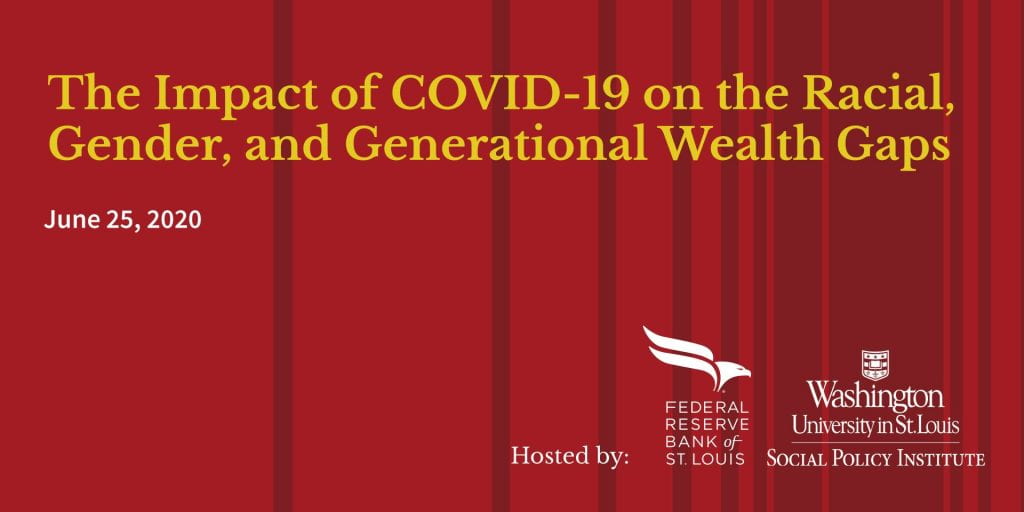As a nation, we’ve made little progress over the last generation in narrowing wealth gaps; in some cases, the gaps have increased. A person’s race, gender, and year of birth (or generation) continue to strongly predict income and wealth outcomes. And COVID-19 is poised to make it even harder for families to recover, let alone get ahead; indeed, many struggling families have yet to financially recover from Great Recession. Though wealth can, if you have it, provide resiliency during hardship, for households already with lower levels of wealth, moments of crisis—such as the pandemic—may intensify their financial fragility.
This event has passed. Watch a recording here.
Join the Social Policy Institute at Washington University in St. Louis and Center for Household Financial Stability at the Federal Reserve Bank of St. Louis from 12:00 to 1:30 p.m. on June 25, 2020 to better understand the likely impacts COVID-19 on family wealth, and some possible responses to those gaps.
Erika Wright, vice president of global philanthropy at JP Morgan Chase, will moderate a panel discussion with national financial wealth experts, Darrick Hamilton, Fenaba Addo, and Ana Hernández Kent. The dynamic conversation will focus on wealth outcomes across race, gender and generations. Additionally, the Social Policy Institute and Center for Household Financial Stability will debut new, original data related to the impact of COVID-19 and household financial security.
Join us to learn about large disparities in family wealth, and how policymaker and others can help restore and build family wealth, resilience and upward economic mobility. After the panel discussion, attendees have an option to stay for a 30-minute deep dive with researchers from SPI and the Center for Household Financial Stability.
Ray Boshara is the director of the Center for Household Financial Stability at the Federal Reserve Bank of St. Louis. The Center conducts research around family savings, assets and debts. He is also a senior fellow in the Financial Security Program at the Aspen Institute. Before joining the Fed in 2011, Boshara was vice president of New America, a think tank in Washington, D.C., where he launched and directed the Asset Building, Financial Inclusion, and Next Social Contract policy programs. He also served as policy director at CFED (Prosperity Now), and on the domestic policy staff of the U.S. House Select Committee on Hunger.
Michal Grinstein-Weiss is the director of the Social Policy Institute at Washington University in St. Louis, Shanti K. Khinduka Distinguished Professor, and associate dean for policy initiatives at the Brown School, and the director of the Centene Center for Health Transformation, housed within the Social Policy Institute. Grinstein-Weiss is a leading expert in the asset-building field and is influential in the design of innovative policies to promote household financial security and social and economic mobility, both in the United States and internationally. She is also a nonresident senior fellow at the Brookings Institution.
Erika Wright is the vice president of global philanthropy at JPMorgan Chase & Co., where she directs the Foundation’s philanthropic investments across Louisiana, Tennessee, and Missouri. Erika oversees a portfolio of economic development, nonprofit, educational, and research partners dedicated to increasing economic opportunity through a combination of workforce, small business, community development, and financial capability initiatives. Prior to joining JPMorgan Chase, Erika served as the Program Lead for Violence Prevention in the New Orleans Health Department, where she led youth violence reduction initiatives across the department. Erika received her undergraduate degree from Morgan State University in Baltimore, MD and served as an English teacher in the U.S. Peace Corps, prior to completing her Masters in Social Work from Washington University in St. Louis.
Darrick Hamilton is the executive director of the Kirwan Institute for the Study of Race and Ethnicity at The Ohio State University. Hamilton is a pioneer and internationally recognized scholar whose work fuses social science methods to examine the causes, consequences, and remedies of racial, gender, ethnic, tribal, and nativity inequality in education, economic, and health outcomes.
Ana Hernández Kent is a policy analyst for the Center for Household Financial Stability at the Federal Reserve Bank of St. Louis. Kent’s primary research interests at the Fed include economic disparities and opportunity, wealth outcomes, class and racial biases, and the role of psychological factors in making financial decisions.
Fenaba Addo is an associate professor of consumer science at the School of Human Ecology at the University of Wisconsin-Madison and a visiting scholar with the Center for Household Financial Stability at the Federal Reserve Bank of St. Louis. Addo’s research agenda examines the role of debt and increasing wealth inequality over the past 40 years within communities of color, among economically vulnerable populations in the U.S., and across the life course.

One Comment
Comments are closed.